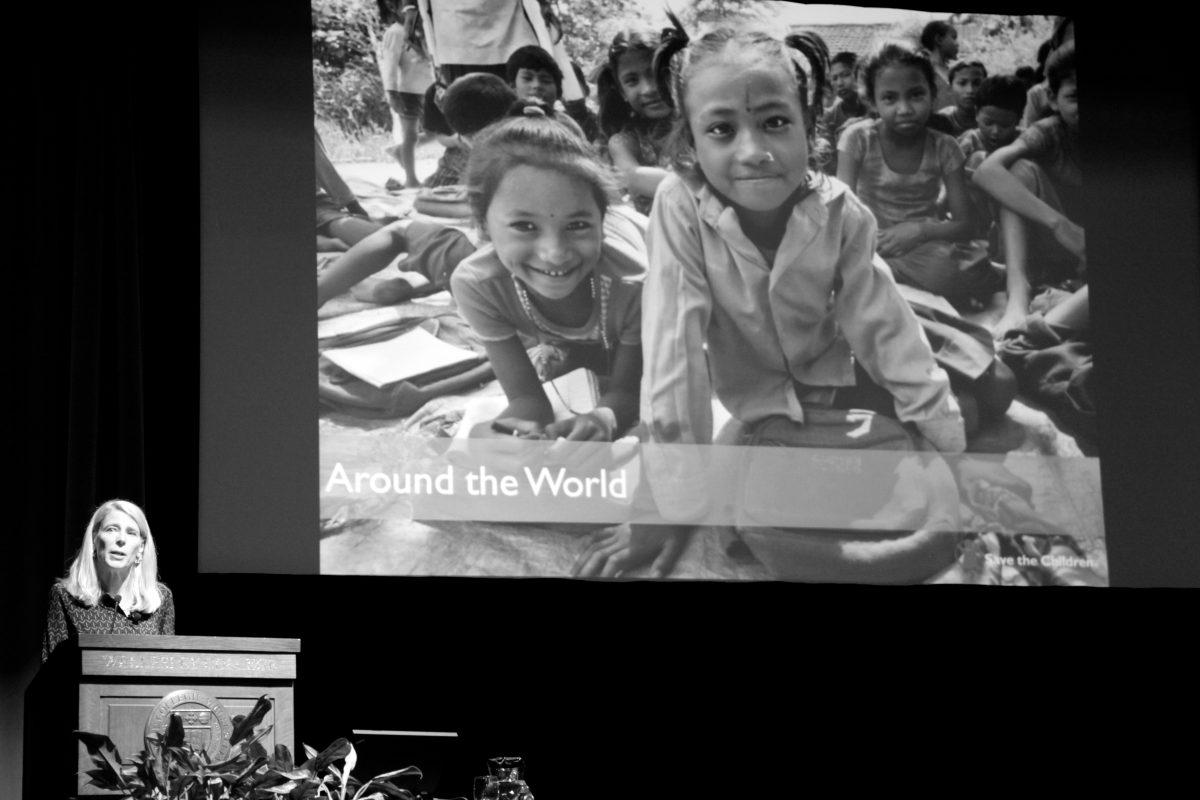By SARA RATHOD ’15 and EVELYN TAYLOR-MCGREGOR ’16
News Editor and Assistant News Editor
In honor of the 100th anniversary of the Child Study Center, the College chose President and CEO of Save the Children Carolyn Miles to deliver this year’s Wilson Lecture. Miles’ talk focused on the importance of early education, such as preschool and primary school, for children in the United States and abroad.
About 6.6 million children die every year of preventable causes. Approximately 40 percent die as a result of malnutrition. Low-cost solutions such as an increase in trained birth attendants are enough to save lives while imposing minimal costs on society.
After discussing the social benefits associated with investing in children’s health and education, Miles delved into the economic reasons ensure that young children are healthy and well-educated. Every year it is estimated that developing countries lose two to three percent of their GDP to reduced productivity as a result of workers whose growth was stunted by malnutrition when they were children.
Wilson believes the benefits of investing in children far outweigh the costs.
“Not only is it the right thing to do, but it’s the smart thing to do,” she said.
Save the Children currently operates programs in 90 countries worldwide. Each program is developed by local employees and tailored to local needs. Miles stated that although the programs share the same basic premise, programs are localized for each particular community.
Save the Children has been involved in discussions about the U.N. Post–2015 Development Goals that will follow the Millenium Development Goals. Miles stated that Save the Children is pushing for “zero percent” development goals, such as zero percent child mortality, and an overall emphasis on children.
Save the Children has 117 programs in 14 states and D.C. in the United States, in addition to its many programs outside of the country. Miles discussed several domestic programs in her lecture, all of which focus on early education and literacy for underprivileged toddlers in rural areas.
Currently, one in four children in rural areas live in poverty, and nearly two out of three low-income families in the United States don’t own books for children to read. Two-fifths of all children in the United States are not enrolled in preschool, placing the United States at No. 28 out of 38 developed countries in terms of the percentage of children enrolled in preschool, behind Estonia, Slovenia and Germany.
Miles also spoke about the organization’s involvement in the federal Head Start program, as well as a complementary Save the Children book sharing program, which provides books for families that may not have been able to afford them otherwise.
Simone Dufresne ’12, who became an assistant teacher and intern after volunteering at the Child Study Center for a year, agreed that small contributions to a child’s early learning can drastically improve his or her performance later in life.
“It’s amazing how just a little boost can really have an impact on the future,” Dufresne said.
Miles also spoke about how the recent government shutdown is affecting programs like Head Start, a program that prepares preschool-aged children from low-income families for school. Due to the shutdown, parents who have kids enrolled in the program are having difficulty buying food. If the government doesn’t start up again soon, parents will probably begin withdrawing their kids.
Wellesley will continue to celebrate the 100th anniversary of the Child Study Center through other events. The College is planning a reception in the Science Center to be held on Nov. 4, to celebrate the exact anniversary of the day that the center was founded.






